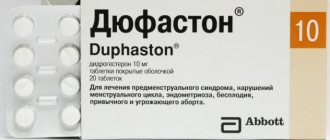Menstrual irregularities manifest themselves in different ways and some women suffer from prolonged periods or hypermenorrhea. The pathology is characterized by long-term and heavy bleeding, which must be stopped with the help of medications. According to reviews, the use of Vikasol to stop menstruation provides the desired result - they decrease and gradually stop. Doctors recommend the drug, but only for menstruation not associated with pathology of the female genital organs.
How does Vikasol work?
The work of sodium menadione bisulfite begins seven hours after administration, but the amplitude reaches 24 hours, this depends on the rate of metabolism of the active substance. After absorption, it binds to plasma proteins and affects the prothrombin factor, which regulates blood clotting. The active substance is also converted into vitamin K. Excretion occurs in the urine in the form of metabolites. The effect of the drug also affects the menstrual cycle, so Vikasol is used during menstruation to stop and call them.
Sodium menadione bisulfite activates the production of prothrombin, a special protein that triggers blood clotting. In case of heavy periods that last longer than expected, the drug Vikasol will stop hemorrhages and reduce the amount of discharge due to its clotting ability.
The hemostatic and anticoagulant drug Vikasol is used to delay menstruation and stop hemorrhage. You cannot take the drug on your own; indications for use are assessed only by a gynecologist. You need to make sure that prolonged menstruation is not associated with uterine bleeding. The causes may be fibroids, malignant tumors, trauma and other pathologies that threaten the woman’s life. In some cases, it is enough to regulate the cycle with the progesterone drug Duphaston and no longer resort to coagulants. Only a doctor recommends Vikasol after an examination.
When to use
Many gynecologists prescribe the medicine in a therapeutic complex for uterine bleeding and various etymologies caused by:
Moreover, it is worth highlighting a number of pathological processes affecting the organs of the reproductive system, in which the drug, both in the form of tablets and in the form of injections, is an indispensable assistant:
- Prolonged bleeding caused by sudden changes in hormonal levels. Malfunctions of the thyroid gland, adrenal glands and ovaries, according to experts, can lead to a strong thickening of the endometrial layer and its “loosening”. Such processes are fraught with the occurrence of severe bleeding, and in severe cases, disruptions in the cyclic menstrual cycle.
- Excessive sloughing of mucous brown clots caused by loss of contractility of the uterus. In this case, Vikasol is prescribed as a maintenance agent to prevent the development of anemia.
- Heavy bleeding during menstruation, associated with the body’s inability to independently synthesize vitamin K.
- Uterine bleeding, the causes of which are various infectious diseases and surgical interventions. In this case, the medicine eliminates not the cause, but the symptom, and therefore is prescribed exclusively as an addition to the main therapeutic course.
Dicynon can be considered an analogue of the drug; instructions for its use during menstruation can be found in the article at the link.
Composition and release form
The drug Vikasol is produced in two forms - in the form of tablets and a solution for injection. Tablets are sold in packs of 20 or 30 pieces, each containing 15 mg of sodium menadione bisulfite. 1 ml ampoules contain a one percent solution of the active substance, packaged in 10–100 doses.
The medication contains synthetic vitamin K. It is produced industrially, the chemical name of the substance is sodium menadione bisulfite. The main effect of the drug is its effect on blood clotting. It is used as a hemostatic agent in emergency medicine and surgical practice. Doctors recommend Vikasol to women suffering from hypermenorrhagia.
Benefits and harms
So, based on the above, the following points can be noted:
- The drug "Vikasol" is relatively safe only when indicated for use, as well as when the dosages prescribed by the doctor are observed.
- This is a fairly potent drug with a profound effect on hemostasis processes.
- If you use the medicine unreasonably for a long time, this will lead to serious and life-threatening conditions: a critical increase in blood pressure, disturbances in heart rhythm and liver function, and the formation of blood clots.
- This is not a panacea for heavy menstrual bleeding. The drug should not be used in official medicine as a means of reducing the duration and heaviness of menstruation when there are no other indications.
Indications for use of Vikasol during menstruation
Doctors actively use the drug, prescribing it for operations, stopping birth hemorrhage, hemorrhage in pregnant women, after gynecological manipulations, etc. Indications for tablets or injections:
- dysfunctional uterine hemorrhages caused by a lack of vitamin K, including prolonged periods;
- endometritis or endometriosis, affecting the timing of menstruation;
- after a medical abortion, which causes menstruation and provokes heavy bleeding in order to expel the fertilized egg.
When using Vikasol to intervene in the menstrual cycle, it is important to strictly follow the dosage of the drug prescribed by the doctor. Otherwise, the hemorrhage may only intensify and last even longer. Problems with blood pressure will arise, which will further affect the patient’s reproductive system.
The amount of the drug to stop hypermenorrhea is clearly indicated in the instructions for use. The volume may vary depending on the form of administration - tablets or injections. To regulate the cycle, gynecologists prefer to recommend that women take the tablet form of Vikasol, and only in emergency cases - in an injection solution.
Instructions for use
The active ingredient in Vikasol is menadione sodium bisulfate, which, when entering the body, is converted into one of the forms of vitamin K and has a hemostatic effect by affecting the coagulation system.
Composition and release form
Vikasol for menstruation is prescribed either in tablets or in solution for injection. Each tablet contains 15 mg of menadione.
Sold in jars of 30 or in 3 blisters of 10 pieces each, placed in cardboard boxes along with instructions. The solution is sold in 10 ampoules of 1 ml per package.
Dosage
Vikasol tablets for menstruation are used in a single dose of 1 tablet (15 mg), the maximum daily intake is not more than 60 mg. In this case, injections are rarely prescribed, but the regimen is standard: 1 ml once a day. If there is no improvement, repetition is allowed, but not exceeding a total of 30 mg (3 ampoules).
Indications for use
When getting acquainted with the effect of Vikasol, you will not find instructions for use during menstruation, since this fact is not highlighted separately in it.
Take Vikasol to stop heavy periods as prescribed by your doctor and in the dosage prescribed by him.
The main indications for its use are:
- acute inflammation of the liver, hepatitis;
- parenchymal bleeding;
- in case of injury or due to low coagulability;
- prevention of blood loss from capillaries during preparation for and after surgery;
- stomach bleeding.
But gynecology does not ignore Vikasol.
According to the instructions, it is prescribed in the following situations:
- in the complex treatment of dysfunctional uterine bleeding;
- with menorrhargia;
- during operations on the genital organs;
- in the third trimester of pregnancy for prophylaxis at risk of bleeding.
Experts point to the undeniable benefits of using Vikasol in this area, and instructions for menstruation, if they go beyond the norm, are corrected by a gynecologist. A competent and qualified doctor will always figure out which treatment regimen will be optimal and whether stopping is possible in a particular case.
Before surgery, the drug is prescribed 2-3 days in advance, and for women in labor - upon admission to the maternity hospital if blood loss is suspected during childbirth.
Contraindications
Contraindications for the use of Vikasol are:
- increased coagulability;
- individual intolerance to menadione;
- thromboembolism.
Read the contraindications of Vikasol before starting to take these tablets.
During pregnancy, this drug is used according to indications. It is believed that Vikasol should not cause harm to either the child or the mother, since vitamin K does not pass well through the placental barrier and does not penetrate into breast milk.
Side effects
Side effects may occur if the recommended dose is exceeded.
It manifests itself:
- in the form of an increase in prothrombin levels;
- in the appearance of itching, rash, urticaria.
Contraindications
Like many medicines, Vikasol has restrictions on its use. The action of the medication affects the functioning of the circulatory system, which ensures the vital functions of the entire body, so it is imperative to take it only in the absence of contraindications. Before prescribing, the gynecologist must find out whether the patient has a history of diagnoses for which Vikasol cannot be used. The medicine is not recommended for:
- liver failure;
- thromboembolism;
- increased blood clotting;
- individual sensitivity to the components of the product;
- pregnancy (to be discussed separately with your doctor);
- simultaneous consumption of alcoholic beverages.
If you violate the rules of administration or take a large dosage, this can adversely affect the functioning of internal organs and provoke more heavy bleeding. Women using Vikasol during menstruation should monitor possible side effects and tell their doctor if they feel worse. Frequent side effects from taking menadione sodium bisulfite in case of hypersensitivity are itching, urticaria, bronchospasm, dizziness, tachycardia, and pressure changes.
Contraindications and possible consequences after taking
Price and analogues
The development of side effects depends on the abundance of menstruation and individual tolerance to the drug. Skin rashes similar to urticaria may appear. A woman may feel weakness, loss of strength, and possible surges in blood pressure. If the daily dose of the drug is exceeded, blood clots may form, and this is a risk of stroke or heart attack.
But most often the most serious side effect, which is observed in every 3 women, is the development of inflammatory processes in the uterine cavity. This is caused by the remains of the endometrium and blood clots in the organ cavity. This phenomenon is observed in women with heavy discharge due to fibroids or endometriosis.
Like any other medicine, Vikasol may cause some side effects. If they appear, you should consult a doctor; if symptoms worsen, discontinue the drug. Side effects include:
- allergic reactions, which can manifest themselves in the form of itching, urticaria, rash, redness of the skin;
- reactions from the cardiovascular system: low blood pressure, tachycardia;
- reactions from the respiratory system: bronchospasm and/or swelling (mainly in patients with a history of asthma);
- hemolytic anemia;
- disruption of normal liver functions;
- dizziness and headaches;
- change in taste.
The drug is continued to be taken if the side effects are minor and do not threaten the general health of the patients. Otherwise, Vikasol is canceled, and other medications are chosen to stop menstruation.
Vikasol: instructions for menstruation
Intervention in physiological processes is always undesirable. Especially if it is the menstrual cycle. It depends on many factors, hormonal balance, which is very easy to disrupt and difficult to restore. Therefore, to delay periods with Vikasol or stop them, doctors take a balanced approach to prescribing the drug, taking into account all the pros and cons. First of all, doctors focus on compliance with the recommended dosage and duration of use. This is the only way to use the drug and not disrupt hemostasis.
How to take Vikasol to stop menstruation?
To stop menstruation, take 2 tablets a day at regular intervals. Ideal - in the morning and evening. The duration of administration is on average 2-3 days until the bleeding stops.
How to take Vikasol during heavy periods?
If a woman has significant blood loss and there is no tendency to reduce menorrhagia, then the doctor may prescribe an injection of sodium menadione bisulfite. Usually one dosage is enough to notice a reduction in discharge. Otherwise, the doctor will recommend the tablet form - 1 or 2 tablets per day, depending on the dynamics.
How to take Vikasol to delay your periods?
To delay menstruation or make it scanty and not interfere with a woman’s life, you need to take the pills a week before the expected date of bleeding. Dosage - 1-2 pieces per day. As a result, the cycle will shift by 3-4 days or spotting or incomplete menstruation will appear.
Question: How to use Vikasol to delay menstruation?
The site provides reference information for informational purposes only. Diagnosis and treatment of diseases must be carried out under the supervision of a specialist. All drugs have contraindications. Consultation with a specialist is required!
How to use Vikasol to delay menstruation?
The drug Vikasol is a synthetic analogue of vitamin K, which ensures normal blood clotting. Therefore, Vikasol is classified as a hemostatic agent. Vikasol is used to reduce bleeding, as it increases blood clotting. In gynecological practice, the use of this drug can reduce the amount of blood lost and shorten menstruation. Regular use of Vikasol makes menstruation more scanty.
Currently, the effect of increasing blood clotting under the influence of Vikasol is used by women to delay the onset of menstruation. However, women should know that Vikasol will not be able to stop menstruation; under its influence, menstruation can only become scantier and shorter in duration. To obtain the required effect, Vikasol should be taken at least a week before the onset of menstruation, since the drug does not act immediately, but only 5 to 7 days after the start of use.
To make menstruation scanty and short, you should take Vikasol during the week before your period begins as follows:
- Take 1 tablet 2 times a day;
- Once a day, administer 0.03 g of Vikasol intramuscularly.
Having decided to regulate the menstrual cycle with Vikasol, women should remember that this is a serious medication that affects blood clotting. Therefore, if a woman has bleeding disorders, then Vikasol should not be taken. You also need to know that by increasing blood clotting, Vikasol increases the risk of thrombosis.
Timely menstruation is one of the main indicators of the health of a woman’s reproductive system. But what to do if the bleeding suddenly increases in volume or the “critical days” coincide with an important event or a long-awaited vacation? In what cases can hemostatic agents be taken? Is Vikasol used to stop menstruation? What are its active components? Let's try to understand these issues in this article, relying on the opinions of gynecologists and women who have already used this drug to “tame” menstruation.
Analogue of Vikasol for menstruation
Sometimes the drug is not suitable for all women due to incompatibility with other medications and the presence of contraindications. In this case, doctors consider analogues of Vikasol tablets for menstruation and use substitutes. Instead of sodium menadione bisulfite, it is recommended:
- Dicynone;
- Tranexam;
- Witch hazel;
- Kontriven;
- Vilate;
- Recombinant;
- Thrombin;
- Tahacombe;
- Octanate;
- Etamzilat.
Each of these drugs that stop bleeding, however, should not be taken independently; look for analogues and make a replacement. The doctor will take into account the woman's health condition and recommend the best medication suitable for her. It is also possible to use medicinal herbal preparations if industrial pharmacy is contraindicated. Chamomile, nettle, valerian, cinquefoil, and St. John's wort are used as hemostatic agents.
General characteristics of Vikasol
The active ingredient of the drug Vikasol is a water-soluble synthetic analogue of vitamin K, one of the blood clotting factors. Its second name is vitamin K3 or menadione. The task is the formation of prothrombin, which is responsible for stopping various bleeding.
The risk of hemorrhages is quite high with a lack of vitamin K3, so Vikasol is often used to stop bleeding.
Once in the body, its maximum amount in the blood occurs after twelve hours. It turns into vitamin K3, which takes part in the work and formation of various blood factors. Chemical reactions occur primarily in the liver, myocardium and skeletal muscles.
The drug is excreted primarily through the kidneys, with urine - 70%, the remaining 30% is metabolized in the liver.
General indications for prescribing Vikasol:
- Obstructive jaundice, in which bile does not enter the intestine and a state of hypoprothrombinemia develops
- For internal bleeding in parenchymal organs (liver, spleen, pancreas, kidneys)
- For bleeding from dilated hemorrhoids of the rectum
- For nosebleeds
As you can see for yourself, Vikasol is a serious pharmacological drug that takes part in complex chemical reactions in the body. And starting to drink it because of a friend’s advice is quite strange.
Reviews of the use of Vikasol during menstruation
The drug has become widespread, so patients and doctors leave reviews on its use to regulate the menstrual cycle in women with hypermenorrhagia. Doctors carefully prescribe Vikasol, taking into account not only its expected effect, but also all the risks that the patient faces. Therefore, the medicine is recommended after screening or if it is necessary to immediately stop bleeding in order to conduct a full examination of women’s health and identify the cause of the pathology. Most doctors speak positively about the experience of using the drug in their practice.
Patients using Vikasol note its rapid effect. Mostly, women achieved the desired result of stopping menstruation on the second day of taking the pills or after injections. Among the disadvantages were the pain of the injections, and some patients experienced side effects.











